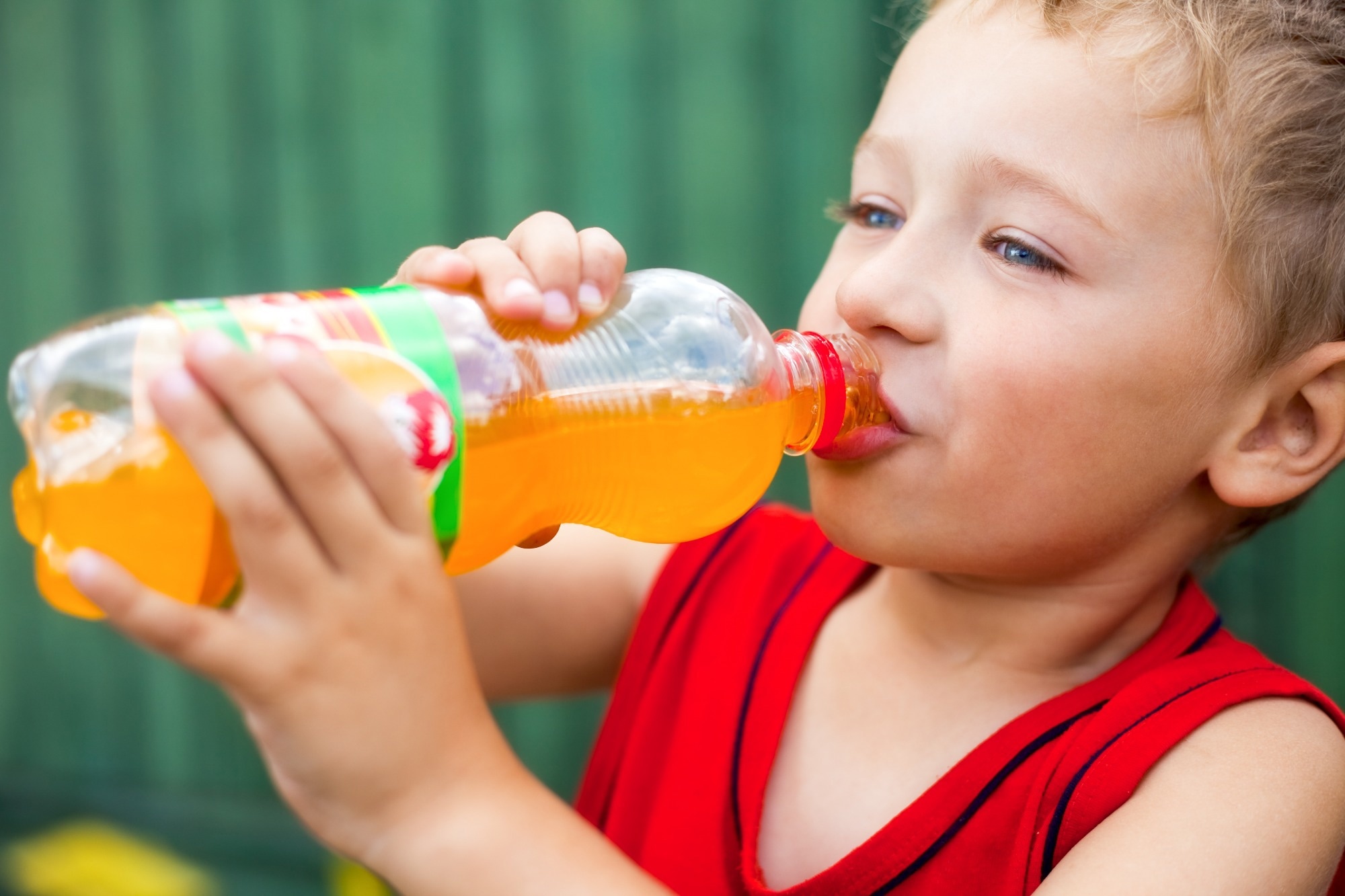Their results indicate that consumption of sweet beverages in early life is associated with greater adiposity and less healthy dietary patterns in adulthood, with implications for dietary interventions for young children.
 Study: Early exposure to sugar sweetened beverages or fruit juice differentially influences adult adiposity. Image Credit: Dundanim / Shutterstock
Study: Early exposure to sugar sweetened beverages or fruit juice differentially influences adult adiposity. Image Credit: Dundanim / Shutterstock
Background
Sugar-sweetened beverage (SSB) consumption during childhood has been associated with higher risks of obesity. However, many studies treat carbonated drinks, fruit juices without additional sugar, and all other sweet drinks as similar.
Considering SSBs and fruit juices separately to ascertain which are associated with adverse outcomes can improve dietary interventions to reduce adult obesity. SSB consumption may also be an indicator of a calorie-rich diet, in which case removing it from the diet would not significantly reduce energy intake.
About the study
In this study, researchers set out to test the hypothesis that all sugary drinks belong to the same category in terms of their effect on adiposity outcomes. They also tested whether their influence should be considered as part of an overall dietary pattern and whether gender-based responses to beverage choices are different.
The study sample consisted of children born in Bristol, the United Kingdom, from April 1991 to December 1992. Their diet was assessed at six points when the children were two, three, four, seven, 11, and 13.
When they were two years old, their carers were asked if they had consumed cola or other carbonated drinks and fruit juices, including apple juice and squash, between 15 months and two years. They defined early exposure to a drink as consumption before the age of two.
During the following dietary assessment, their carers filled up a food frequency questionnaire to provide insights into dietary patterns, noting consumption of fatty foods, sweet-tasting foods, fruits and vegetables, and other foods such as fish, meat, and pizza.
Carers completed three-day dietary diaries when the children were four and seven, while 11 and 13-year-olds filled the diaries themselves.
Their height and weight were measured to calculate BMI. Android fat mass was measured as the abdominal fat present around the organs. The other primary outcome was their total fat mass at the age of 24.
Data analysis included hierarchical regression equations, and models were adjusted for the mother’s prenatal weight, her age when the child was born, her partner’s education and BMI, the mother’s and her partner’s occupation, and deprivation in terms of income, health deprivation, disability, employment, housing, education, training, and skills. Male and female groups were analyzed separately.
Findings
For males, cola consumption was associated with higher adiposity; individuals who did not drink apple juice had a higher BMI, on average. Drinking fruit squash but not pure fruit juice was associated with higher adiposity in females.
Researchers then explored whether the relationships they saw were due to the sweet drinks alone or the overall dietary pattern.
Children who consumed fruit squash, fizzy drinks, or cola at the age of three consumed more carbohydrates, energy, protein, non-milk extrinsic sugars, and fats but lower levels of non-starch polysaccharides. Those who consumed apple juice consumed more proteins and healthy sugars but less fat.
These associations indicate that overall dietary patterns must differ as SSBs do not contain fat or protein.
Boys who consumed fruit squash, fizzy drinks, and cola also consumed more sausages, burgers, French fries, pizza, chocolate, sweets, and meat but ate less fruit. Those who drank apple juice ate more salad, green vegetables, fruits, and fish. Similar patterns were seen for girls.
Another interesting finding was that boys who consumed cola before they turned two also consumed more energy when they were four to nine years old. Meanwhile, girls who consumed apple juice showed lower energy intake at the age of four.
Regression results indicated that diet was a predictor of body fat for males at 24 years old; consumption of root vegetables, burgers and sausages, and French fries at the age of three had a significant effect. Similar results were seen for females; additionally, those who did not consume fresh fruit or biscuits had higher fat mass.
More significant social deprivation was associated with a higher likelihood of children drinking cola and a lower likelihood of them drinking fruit juice.
Conclusions
These findings indicate that sweet beverage consumption in early life is significantly linked to health outcomes well into adulthood. The beverages children consume are affected by their family’s socioeconomic and demographic characteristics, with children from more deprived households being more likely to receive unhealthy beverages like cola and less likely to drink relatively healthier drinks such as pure fruit juice.
The study adds to a growing body of evidence that dietary patterns during early childhood significantly affect obesity risk in adulthood. Nutritional interventions to control energy intake during infancy and early childhood may be effective in curbing the issue of adult obesity.
Journal reference:
- Early exposure to sugar sweetened beverages or fruit juice differentially influences adult adiposity. Benton, D., Young, H.A. European Journal of Clinical Nutrition (2024). DOI: 10.1038/s41430-024-01430-y, https://www.nature.com/articles/s41430-024-01430-y